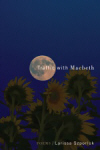Traffic with Macbeth
Like Shakespeare’s play, Traffic with Macbeth is a fearless journey into the depths of myth, the human psyche, and often violence. There is a density to many of the poems, which at times renders them a bit opaque. Yet, so well-crafted are the lyrics that the hard shells of her images beg to be cracked. Images that are impenetrable are simultaneously beautiful and terrible and remind the reader of the artistry of mystery. However, no matter the difficulty of meaning, Szporluk’s tone always rings clear. At every step, the tongues of Macbeth’s witches and Macbeth’s own tortured soul slouch at the margins of these poems, whispering to them, feeding them the macabre spirit that produced such haunting lyrics as those in “Baba Yaga”:
Like Shakespeare’s play, Traffic with Macbeth is a fearless journey into the depths of myth, the human psyche, and often violence. There is a density to many of the poems, which at times renders them a bit opaque. Yet, so well-crafted are the lyrics that the hard shells of her images beg to be cracked. Images that are impenetrable are simultaneously beautiful and terrible and remind the reader of the artistry of mystery. However, no matter the difficulty of meaning, Szporluk’s tone always rings clear. At every step, the tongues of Macbeth’s witches and Macbeth’s own tortured soul slouch at the margins of these poems, whispering to them, feeding them the macabre spirit that produced such haunting lyrics as those in “Baba Yaga”:
I cooked my little children in the sun.
I threw grass on them and then they died.
I sit here now and wonder what I’ve done.
After the massacre, the poem delves into a spot-on description of numbness, of a tuning in to a world that is suddenly mechanical, and a self that is suddenly hollowed:
That’s why I get back to work
and listen to the clock and not my mind.
Wisdom ticks against the wise-man
who tries to teach the wicked to be kind
(but my eyes are holes and his old breath
just whistles through the jimson
in my garden).
Without flinching, Szporluck continues Baba Yaga’s dark tale, giving us the scene of the death:
babies, looking at the sky with so much love
As I bent to light your toes, the second
split and I was witch but still your mother.
The cooked children were wide-eyed with wonder at the world when the mother dipped into a dark transformation, much like Macbeth did when he slew the king. There is an awful tenderness in the admission that the Baba Yaga, or witch, did not completely take over the mother, but that it coupled with her, that she was a dual entity. It’s tender because she was still human, not completely overtaken—and thus, we can hope, still sympathetic, still dangling by some shreds of humanity. It’s awful because that humanity was not enough to stop her from lighting their feet, that she, like Macbeth, needed to satiate a deeper appetite at the expense of another’s life.
Hunger is rampant in Szporluk’s poems, whether that of a witch mother, a gargoyle, time, or God himself. Like Macbeth, these characters and symbols push past the limits of propriety and sink deep into the squalor of their souls. It is an awful, beautiful, magical, and brave trip that Szporluk takes us on, worth every line and every image. I will end by quoting one of those tightly locked images of Szporluck’s that I mentioned above. It’s from the poem “Fiddlehead.” The genius of this line speaks for itself:
The sound of a spine
in a tongue-tied forest.





